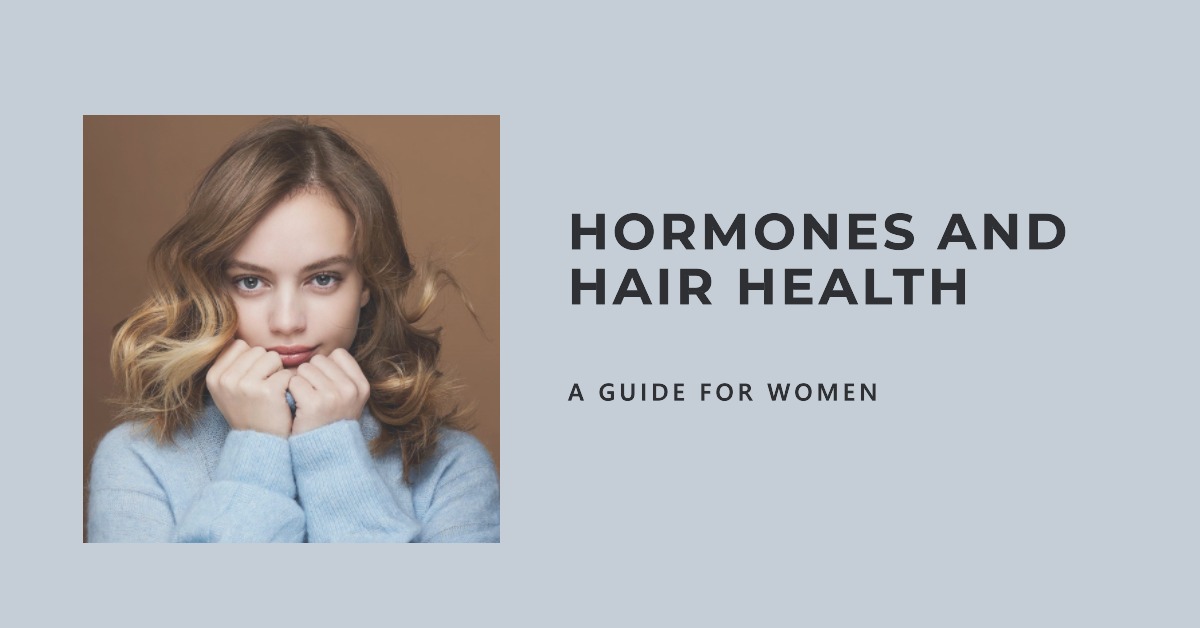Hormones play a pivotal role in women’s hair health by regulating the growth cycle of hair follicles. Estrogen prolongs the anagen phase, promoting hair growth and density, while progesterone balances estrogen’s effects and supports follicle health. Androgens, particularly DHT, can shorten the growth phase, leading to androgenic alopecia. Thyroid hormones also impact hair; hyperthyroidism causes thinning, and hypothyroidism leads to coarse, dry hair. Hormonal imbalances during life stages like menopause or postpartum can result in noticeable hair changes. Regular hormonal assessments and targeted treatments can restore hair health and mitigate hair loss. To discover more, you should explore further.
Understanding Hormones and Hair
Hormones play an essential role in regulating the hair growth cycle, influencing everything from follicle development to shedding patterns. Understanding how hormonal balance affects your hair follicles is vital for maintaining ideal hair health. Hormones such as androgens, thyroid hormones, and cortisol can noticeably impact the growth phases of hair follicles, namely anagen (growth), catagen (transitional), and telogen (resting).
When your hormonal balance is disrupted, it can lead to various hair issues. Elevated levels of androgens, for example, can cause hair thinning and androgenetic alopecia, a common type of hair loss in women. On the other hand, an underactive thyroid (hypothyroidism) can lead to diffuse hair shedding, while an overactive thyroid (hyperthyroidism) can cause hair to become fine and brittle. Cortisol, the stress hormone, can push hair follicles into the telogen phase prematurely, resulting in increased hair shedding.
To guarantee your hair follicles remain healthy, it’s important to maintain hormonal balance. Regular check-ups with a healthcare provider can help identify any underlying hormonal imbalances. Blood tests can measure levels of key hormones, allowing for timely interventions. Additionally, lifestyle factors such as a balanced diet rich in vitamins and minerals, regular exercise, and stress management techniques play a pivotal role in maintaining hormonal equilibrium.
Estrogen’s Impact on Hair
Estrogen markedly influences hair growth by prolonging the anagen phase and promoting follicular health. The anagen phase, also known as the growth phase, is crucial for hair length and density. Elevated estrogen levels guarantee this phase lasts longer, resulting in robust hair growth. Estrogen benefits extend to enhancing scalp circulation, which nourishes hair follicles and supports their ideal function.
When you have sufficient estrogen, your hair tends to be thicker, more lustrous, and less prone to shedding. This hormone plays a key role in maintaining the structural integrity of your hair by boosting collagen production, which provides strength and elasticity. Additionally, estrogen helps to modulate sebaceous gland activity, keeping your scalp well-moisturized and less susceptible to conditions like dandruff.
Conversely, an estrogen deficiency can have a detrimental impact on your hair health. As estrogen levels decline, particularly during menopause, you might notice your hair becoming thinner and more brittle. Reduced estrogen shortens the anagen phase, causing hair to enter the resting phase (telogen) prematurely, which leads to increased shedding and less regrowth. Estrogen deficiency can also exacerbate androgenic alopecia, a common type of hair loss in women.
To mitigate the effects of low estrogen, you might consider hormone replacement therapy (HRT) under medical supervision. HRT can help rebalance hormone levels, thereby restoring some of the estrogen benefits for your hair. Always consult with your healthcare provider to discuss the risks and benefits of any treatment.
Understanding the essential role of estrogen in hair health empowers you to make informed decisions about maintaining your hair’s stamina and longevity.
The Role of Progesterone
Progesterone plays an essential role in balancing the effects of estrogen and supports overall hair health by regulating the hair growth cycle and maintaining scalp equilibrium. When progesterone levels are in balance, you can expect reduced hair shedding and improved hair density. This hormone works by counteracting the effects of estrogen, which can otherwise lead to excessive hair growth or loss.
One of the key progesterone benefits is its ability to prolong the anagen phase, the active growth stage of the hair cycle. By extending this phase, your hair has more time to grow before shifting to the resting (telogen) phase, thereby contributing to fuller, thicker hair. Additionally, progesterone possesses anti-androgenic properties, meaning it can inhibit the activity of androgens that may negatively impact hair follicles.
Maintaining progesterone balance is vital. Imbalances can result from various factors, including stress, aging, and certain medical conditions. Symptoms of low progesterone may include increased hair shedding, thinning, and even scalp issues like dryness or flakiness. To guarantee ideal progesterone levels, consider lifestyle changes such as stress management, a balanced diet rich in vitamins and minerals, and regular exercise. In some cases, healthcare providers might recommend bioidentical hormone replacement therapy (BHRT) to restore hormonal equilibrium.
Understanding the role of progesterone in hair health empowers you to take proactive measures. Regular check-ups, blood tests to monitor hormone levels, and consultations with healthcare professionals are advisable steps. By prioritizing progesterone balance, you can greatly improve your hair’s health and overall well-being. Remember, a well-maintained hormonal balance is your best ally in achieving and maintaining healthy, vibrant hair.
Androgens and Hair Health
Androgens, including testosterone and dihydrotestosterone (DHT), significantly influence hair health by affecting the hair growth cycle and follicle function. When your androgen levels are balanced, they contribute to maintaining healthy hair follicles. However, an androgen imbalance can lead to hair health issues, most importantly androgenic alopecia, a form of hair loss.
Androgenic alopecia, also known as female pattern hair loss, is characterized by a gradual thinning of hair, primarily on the crown and frontal scalp. DHT, derived from testosterone by the enzyme 5-alpha-reductase, binds to androgen receptors in hair follicles, shrinking them and shortening the hair growth phase (anagen phase). This results in finer, shorter, and less pigmented hair. Over time, the affected follicles may cease producing hair altogether.
It’s crucial to recognize the signs of androgen imbalance early. Symptoms may include excessive facial or body hair (hirsutism), acne, and irregular menstrual cycles, in addition to scalp hair thinning. Diagnostic tests, such as blood tests measuring testosterone and DHT levels, can confirm an imbalance.
To manage androgenic alopecia, healthcare providers may recommend treatments like topical minoxidil, which can prolong the anagen phase, or oral anti-androgens such as spironolactone, which inhibit androgen activity. Additionally, lifestyle modifications—such as maintaining a balanced diet rich in vitamins and minerals, regular exercise, and stress management—can support overall hormonal balance and hair health.
Understanding the role of androgens in hair health empowers you to take proactive steps. By addressing androgen imbalances promptly, you can mitigate their impact and promote healthier hair growth. Always consult with a healthcare professional before starting any treatment to confirm it’s safe and suitable for your specific needs.
Hormonal Changes in Life Stages
Understanding the impact of androgens on hair health sets the stage for examining how hormonal fluctuations during various life stages also affect women’s hair.
During puberty changes, surges in estrogen and progesterone can lead to increased hair growth. However, the body also starts producing more androgens, which may contribute to oily scalp and the onset of conditions like androgenic alopecia.
Pregnancy changes also bring about significant hormonal shifts. Elevated levels of estrogen during pregnancy prolong the growth phase (anagen phase) of hair, often resulting in thicker, more lustrous hair. Postpartum, however, a rapid drop in estrogen levels can trigger telogen effluvium, a condition where a significant number of hair follicles enter the resting phase, leading to noticeable hair shedding.
Menopause effects are particularly profound. As estrogen levels decline, the balance tips in favor of androgens, which can lead to hair thinning and increased facial hair. Understanding these changes is essential as they can impact not only your hair’s volume and texture but also your overall self-esteem.
Thyroid influence shouldn’t be overlooked. Both hyperthyroidism and hypothyroidism can disrupt the hair growth cycle. Hyperthyroidism often leads to fine, thinning hair due to an accelerated metabolism, while hypothyroidism can cause coarse, dry hair and diffuse hair loss because of a slowed metabolism. Thyroid imbalances are vital to address as they can exacerbate other hormonal issues, further impacting hair health.
Managing Hormonal Hair Issues
Effectively managing hormonal hair issues entails a multi-faceted approach that includes medical treatments, lifestyle adjustments, and targeted hair care routines.
First, you should consult with a healthcare professional to identify specific hormonal imbalances contributing to hair loss. Hormone replacement therapy (HRT) or other prescribed medications, such as anti-androgens, can be effective hair loss treatments, counteracting the effects of hormonal fluctuations.
Dietary influences play an essential role in maintaining hair health. Make sure your diet includes essential nutrients like biotin, zinc, and omega-3 fatty acids, which support hair growth and strength. Incorporate foods rich in these nutrients, such as nuts, seeds, and fatty fish. Additionally, maintaining a balanced diet can help regulate hormone levels, indirectly benefiting your hair.
Stress management is another vital component. Chronic stress elevates cortisol levels, which can exacerbate hair loss. Techniques like yoga, meditation, and regular physical activity can reduce stress and promote hormonal balance.
Your hair care routine should also be tailored to address hormonal hair issues. Use shampoos and conditioners formulated with ingredients like minoxidil, which can stimulate hair growth. Avoid excessive heat styling and harsh chemical treatments that can further damage fragile hair.
Regular scalp massages can improve blood circulation, promoting nutrient delivery to hair follicles. Consider using natural oils like rosemary or peppermint, known for their potential to stimulate hair growth.
Conclusion
In summary, understanding the intricate dance of hormones like estrogen, progesterone, and androgens is essential for maintaining your hair’s vitality.
As you navigate different life stages, these hormonal shifts can either be your hair’s best friend or its worst enemy.
By recognizing these changes and managing them proactively, you can keep your locks luscious.
Remember, knowledge is power; arm yourself with it to guarantee your hair remains your crowning glory.




